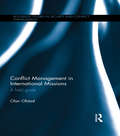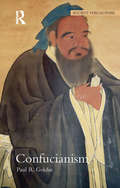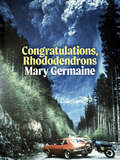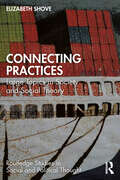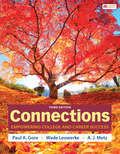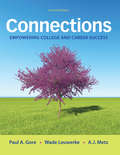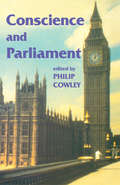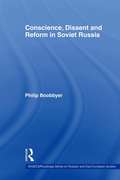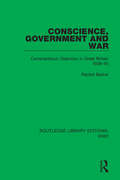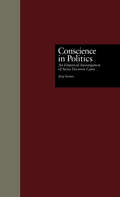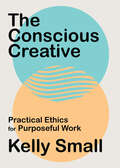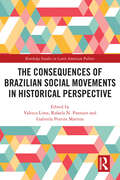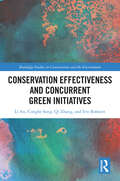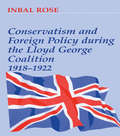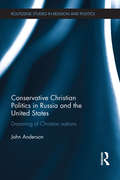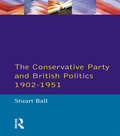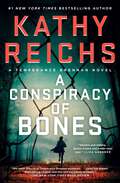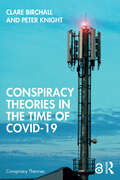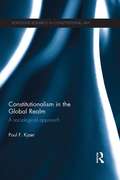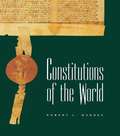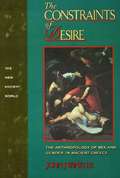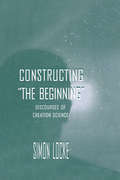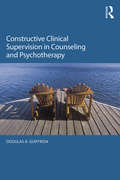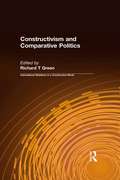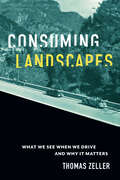Special Collections
Benetech’s Global Certified Accessible Titles
Description: Benetech’s GCA program is the first independent third-party EPUB certification to verify ebook accessibility. By creating content that is born accessible, publishers can meet the needs of all readers. Learn more: https://bornaccessible.benetech.org/
- Table View
- List View
Conflict Management in International Missions
by Olav OfstadThis book serves primarily as a field guide and curriculum for organisations training personnel for conflict management missions abroad. Currently, a gap exists between practitioners and academia in the field of conflict management and peacebuilding. Few practitioners have studied conflict management, and few academics have experience as field workers. Conflict literature contains a range of important insights and analyses, but is useful only to a limited degree to practitioners. This book provides practitioners with a much needed guidebook which is easy to understand, academically solid and which identifies with their mission and helps them relate to real-time challenges in the field. The book focuses on a number of case studies, including peacebuilding efforts in East Timor, and offers a range of practical advice for persons about to embark on a mission, from the receipt of an appointment to establishment in the field and encountering the realities and practical challenges that handling conflicts may imply. This book will be of much interest to students of conflict management, peacebuilding and conflict resolution, as well as practitioners in the field.
Confucianism
by Paul R. Goldin"Confucianism" presents the history and salient tenets of Confucian thought, and discusses its viability, from both a social and a philosophical point of view, in the modern world. Despite most of the major Confucian texts having been translated into English, there remains a surprising lack of straightforward textbooks on Confucian philosophy in any Western language. Those that do exist are often oriented from the point of view of Western philosophy - or, worse, a peculiar school of thought within Western philosophy - and advance correspondingly skewed interpretations of Confucianism. This book seeks to rectify this situation. It guides readers through the philosophies of the three major classical Confucians: Confucius (551-479 BCE), Mencius (372-289 BCE?) and Xunzi (fl. 3rd cent. BCE), and concludes with an overview of later Confucian revivals and the standing of Confucianism today.
Congratulations, Rhododendrons
by Mary GermaineIn her debut collection, Congratulations, Rhododendrons, award-winning poet Mary Germaine offers love poems to an insistently unlovely world.Through poems that speak to plastic bags and drones as much as they admire roses and the moon, Germaine surfs the confluence of artificial and natural environments, technology, and our small but consequential feelings about them. At turns devotional and suspicious, these poems toe the boundaries of intimacy, responsibility, and reason.In anxious times, anything can be taken as a sign; a crow, a talking coin, and a news report are all sources of information whose truth (or “fake-ness”) demand investigation. Germaine’s poems scroll from a shrine in Lourdes to an augmented-reality sandbox, from a mall filled with loitering ex–love interests to a fairy-tale ending where all the men turn out to be chairs. Funny, provocative, sly, and melancholic, Congratulations, Rhododendrons makes a case for the hope that every apparent disaster of social investment might in the end be redeemed as meaningful, genuine, or at least in some way helpful.
Connecting Practices
by Elizabeth ShoveConnecting Practices develops a distinctive method of conceptualising significant trends and global issues including environmental sustainability and inequalities in wealth and health, arguing that these are outcomes of the ways in which social practices interact and combine across space and time. Engaging with the question of how connections are made between practices and how past and present combinations make some futures more likely than others, this book brings practice theory to bear on large problems in society. Richly illustrated with examples from the spreading of germs to the history of shipping containers, this powerful analysis of how societies hang together and how they change will appeal to scholars and students of sociology and social theory.
Connections
by Paul A. Gore and Wade Leuwerke and A. J. MetzWritten by counseling psychologists Paul Gore, Wade Leuwerke, and A.J. Metz, Connections shows students from day one how to develop the mindset, drive, and strengths needed on their way to college, personal, and career success. The expertly designed program is firmly rooted in current research in positive psychology, using self-reflection as a tool for goal-setting; goal-setting as a tool for imagining one's potential; and imagining one's potential as the motivation for realizing it. Connections puts students at the center of their own personalized learning path, facilitates their purposeful choice of an academic and career plan, and develops all the skills they need--cognitive and non-cognitive, academic and life--to foster their self-growth and success.The thoroughly updated new edition addresses current challenges and research, including the growth of online learning (Appendix: Online Learning), diversity and inclusion (revised Chapter 11: Social Belonging), and the science of learning (revised Chapter 5: Understanding Thinking and Learning). These updates are reflected in a new version of ACES—the powerful, state-of-the-art student self-assessment the authors revised concurrently with Connections.
Connections
by Wade Leuwerke and A. J. Metz and Paul GoreConnections is an innovative program, built from the ground up with a growth-mindset approach to college and career success. Written by counseling psychologists Paul Gore, Wade Leuwerke, and A.J. Metz, Connections shows students from day one how to be learners, whose mindset, drive, and strengths will help them meet any challenge on their way to college, personal, and career success. The expertly designed program is firmly rooted in the most current research in positive psychology, using self-reflection as a tool for goal-setting; goal-setting as a tool for imagining one's potential; and imagining one's potential as the motivation for realizing it. Connections puts students at the center of their own personalized learning path, facilitates their purposeful choice of an academic and career plan, and develops all the skills they need--cognitive and non-cognitive, academic and life--to foster their self-growth and success. Built around the most common issues faced in the classroom, LaunchPad for Connections, Second Edition gives students everything they need to prepare for class and exams, including author-developed digital tools linked directly to the eBook, the ACES student self-assessment (taken at the start and end of term), and our acclaimed LearningCurve adaptive quizzing. For instructors, LaunchPad offers everything they need to quickly set up a course, customize the content, prepare presentations and lectures, assign and assess homework, and guide the progress of individual students and the class as a whole.
Conscience and Parliament
by Philip CowleyConsidering how the British policy process deals with "conscience" issues, this book covers eight topics discussed by Parliament in the last quarter of a century - abortion, censorship, divorce, Sunday trading, homosexuality, war crimes, disability rights and animal welfare.
Conscience, Dissent and Reform in Soviet Russia
by Philip BoobbyerThis book embraces the political, intellectual, social and cultural history of Soviet Russia. Providing a useful perspective of Putin’s Russia, and with a strong historical and religious background, the book: looks at the changing features of the Soviet ideology from Lenin to Stalin, and the moral universe of Stalin's time explores the history of the moral thinking of the dissident intelligentsia examines the moral dimension of Soviet dissent amongst dissidents of both religious and secular persuasions, and includes biographical material explores the ethical assumptions of the perestroika era, firstly amongst Communist leaders, and then in the emerging democratic and national forces.
Conscience, Government and War
by Rachel BarkerThis book, first published in 1982, is a systematic and detached analysis of the 60,000 British conscientious objectors in the Second World War, forming an examination of the relationship between the individual and the State in time of war. It sets out to show how the British Government dealt with the challenge that conscientious objectors posed and how far it was able to correct the abuses and injustices that occurred in the First World War. It traces the background of pacifism between the Wars and the introduction of conscription, and gives a detailed account of the functioning of the Conscientious Objectors’ Tribunals and an assessment of their work. It goes on to examine the reactions and attitudes of Tribunal members, employers and the rest of the population, and how these were affected by the Government lead. It recounts the experience of objectors in civilian life and private and public employment, and how they fared in the armed forces and prisons. It also assesses the contributions made by the voluntary organisations who helped conscientious objectors in the war.
Conscience in Politics
by Jurg SteinerFirst published in 1996. Routledge is an imprint of Taylor & Francis, an informa company.
The Conscious Creative
by Kelly SmallAn actionable guide to mindfulness and practical ethics for any creative professional who wants to make a living without selling their soul.It can be difficult to live according to our values in a complicated world. At a time when capitalism seems most unforgiving but the need for paying work remains high, it is important to learn how we can be more mindful and intentional about our impact — personal, social, economic, and environmental.As designer and creative director Kelly Small had to do to navigate a crisis of ethics and burnout in their career in advertising, we can admit our complicity in problematic systems and take on the responsibility of letting our own conscience guide our decisions.Start with one or many of these 100+ rigorously researched, ultra-practical action steps:Co-create and collaborateGet obsessed with accessibilityDemand diverse teamsCommit to self-careMake ethics a competitive edgeBe mindful of privilegeCreate for empowerment, not exploitationWith a humorous and irreverent tone, Small reveals how when we release unnecessary judgement and become action-oriented, we can clarify the complicated business of achieving an ethical practice in the creative industries. Discover the power of incremental, positive changes in our daily work-lives and the fulfillment of purposeful work.
The Consequences of Brazilian Social Movements in Historical Perspective
by Valesca Lima, Rafaela N. Pannain and Gabriela Pereira MartinsThis book sheds light on the outcomes of social movement in Brazil. It provides an extensive analysis of how and when collective mobilization and protest activities brought about social and political change. Charting the dynamics and characteristics of Brazil’s social movements from the abolition of slavery in 1888 to the present day, the contributors to this edited volume demonstrate the processes of social movement activism in Brazil, and its relations with political institutions across various types of governments and political regimes. They bring to light both political opportunity structures of different historical periods, and the political and cultural consequences of mobilization stemming from the collective action of social movements. Showcasing various approaches, the book encompasses a plurality of methodological perspectives including network analysis, collective memory, trajectories, and quantitative techniques of process analysis. Ultimately, the authors present new empirical evidence about social movement outcomes in Brazil, including the mobilization for housing rights, institutionalization processes in a re-democratized society, the effects of anti-dictatorship movements on activists, transformations of political agendas and the diffusion of social protests. Interdisciplinary at its core and highly engaging, The Consequences of Brazilian Social Movements in Historical Perspective offers essential reading on social movement studies to academics, activists and students.
Conservation Effectiveness and Concurrent Green Initiatives
by Qi Zhang and Li An and Conghe Song and Eve BohnettThe book examines concurrent green initiatives and their spillover effects on environmental conservation and management to reveal their impact on conservation effectiveness, drawing on a range of international case studies. Green initiatives are programs, payments, or endeavors that restore, sustain, or improve nature’s capacity, with examples including payments for ecosystem services and the development of nature reserves and protected areas. This book explicitly examines concurrent green initiatives, where initiatives overlap either geographically or in terms of recipients of multiple payments. The book provides a detailed analysis of case studies in the USA and China, including the USA-based Conservation Reserve Program and the Environmental Quality Incentives Program, and the China based Grain-to-Green Program and the Forest Ecological Benefit Compensation Fund. Through this comparison, the book shows the impact of concurrent green initiatives, including additional or unintended benefits for conservation and local communities as well as negative spillover effects. The book complements these case studies by drawing on other global examples ranging in size from local to continental, including planting native trees and shrubs in Australia and green initiatives in the Baltic Sea region. Overall, this book demonstrates the importance of analyzing concurrent green efforts to better understand both the positive and negative impacts to ensure the optimal effectiveness of these policies and programs for conservation and environmental management. This book will be of great interest to students and scholars of environmental conservation and management, land use, ecosystem services and environmental policy, as well as policymakers and practitioners working on environmental initiatives and programs.
Conservatism and Foreign Policy During the Lloyd George Coalition 1918-1922
by Inbal RoseRose analyses the Conservative response to the foreign policy strategies in the post-war coalition, highlighting the complex nature and development of Conservative foreign policy thinking.
Conservative Christian Politics in Russia and the United States
by John AndersonThis book explores the politics of conservative Christian churches and social movements in Russia and the United States, focusing on their similar concerns but very different modes of political engagement. Whilst secularisation continues to chip away at religious adherence and practice in Europe, religion is often, quite rightly, seen as an influential force in the politics of the United States, and, more questionably, as a significant influence in contemporary Russia. This book looks at the broad social movement making up the US Christian Right and the profoundly hierarchical leadership of the Russian Orthodox Church as socially conservative actors, and some of the ways they have engaged in contemporary politics. Both are seeking to halt the perceived drift towards a more secular political order; both face significant challenges in handling the consequences of secularism, pluralism and liberal individualism; and both believe that their nations can only be great if they remain true to their religious heritage. In exploring their experience, the book focuses on shared and different elements in their diagnosis of what is wrong with their societies and how this affects their policy intervention over issues such as religious and ethnic belonging, sexual orientation and education. Drawing on political, sociological and religious studies, this work will be a useful reference for students and scholars of religion and politics, Russian politics and American politics.
The Conservative Party and British Politics 1902 - 1951
by Stuart BallThe history of the Conservative Party during the first half of the twentieth century was marked by crisis and controversy, from Joseph Chamberlain's tariff reform campaign through the Lloyd George coalition and the National Government between the wars to the defeat of 1945 and the post war recovery. This study provides a lucid account of this turbulent and formative period in the history of the most durable and adaptive force in modern British politics.
A Conspiracy of Bones
by Kathy Reichs#1 New York Times bestselling author Kathy Reichs returns with an &“edgy, eerie, irresistible&” (Sandra Brown) novel with &“plenty of twists&” (The New York Times Book Review) featuring forensic anthropologist Temperance Brennan, who must use her skills to discover the identity of a faceless corpse, its connection to a decade-old missing child case, and why the dead man had her cell phone number.It&’s sweltering in Charlotte, North Carolina, and Temperance Brennan, still recovering from neurosurgery following an aneurysm, is battling nightmares, migraines, and what she thinks might be hallucinations when she receives a series of mysterious text messages, each containing a new picture of a corpse that is missing its face and hands. Immediately, she&’s anxious to know who the dead man is, and why the images were sent to her. An identified corpse soon turns up, only partly answering her questions. To win answers to the others, including the man&’s identity, she must go rogue, working mostly outside the system. That&’s because Tempe&’s new boss holds a fierce grudge against her and is determined to keep her out of the case. Tempe bulls forward anyway, even as she begins questioning her instincts. But the clues she discovers are disturbing and confusing. Was the faceless man a spy? A trafficker? A target for assassination by the government? And why was he carrying the name of a child missing for almost a decade? With help from law enforcement associates including her Montreal beau Andrew Ryan and the quick-witted, ex-homicide investigator Skinny Slidell, and utilizing new cutting-edge forensic methods, Tempe draws closer to the astonishing truth. &“A complete success&” (Booklist, starred review), &“this is Kathy Reichs as you&’ve never read her before&” (David Baldacci).
Conspiracy Theories in the Time of Covid-19
by Peter Knight and Clare BirchallConspiracy Theories in the Time of Covid-19 provides a wide-ranging analysis of the emergence and development of conspiracy theories during the Covid-19 pandemic, with a focus on the US and the UK. The book combines digital methods analysis of large datasets assembled from social media with politically and culturally contextualised close readings informed by cultural studies. In contrast to other studies which often have an alarmist take on the "infodemic," it places Covid-19 conspiracy theories in a longer historical perspective. It also argues against the tendency to view conspiracy theories as merely evidence of a fringe or pathological way of thinking. Instead, the starting assumption is that conspiracy theories, including Covid-19 conspiracy theories, often reflect genuine and legitimate concerns, even if their factual claims are wide of the mark. The authors examine the nature and origins of the conspiracy theories that have emerged; the identity and rationale of those drawn to Covid-19 conspiracism; how these conspiracy theories fit within the wider political, economic and technological landscape of the online information environment; and proposed interventions from social media platforms and regulatory agencies. This book will appeal to anyone interested in conspiracy theories, misinformation, culture wars, social media, and contemporary society.
Constitutionalism in the Global Realm
by Poul F. KjaerThis book develops a sociologically informed theory of constitutionalism in the global realm, addressing both national and transnational forms of constitutional ordering. The book begins with the argument that current approaches to constitutionalism remain tied to a state-based conception of constitutions, and overlooks underlying structural transformations that trigger the emergence of constitutional forms of ordering. Poul F. Kjaer aims to address this shortcoming by offering a sociological and historically informed analysis of the evolution of constitutionalism in the face of globalisation. The analysis contextualises on-going constitutional developments through the use of a long-term historical perspective, which is capable of highlighting the impact of deeper structural transformations unfolding within society. The book looks at the ways in which national and transnational legal forms have evolved alongside one another. It demonstrates that the formation of global constitutions has not resulted in a corresponding decrease in the power of nation states, but instead, legal and political aspects of both the nation state and the transnational have been reconfigured and intensified in a mutually supportive manner. In combining insights from a range of fields, this interdisciplinary book will be of great interest to students and scholars of constitutional law, sociology, global governance studies, and legal, social and political theory.
Constitutions of the World
by Robert L. MaddexFrom Algeria to Zimbabwe, Constitutions of the World is a guide to the constitutions and constitutional histories of eighty nations. It will prove an invaluable resource for any teacher or student interested in politics, law, human rights or the political history of nations across the world. Strucured alphabetically each chapter profiles one country in an easy-to-use format. For every country a wealth of information is to be found.
The Constraints of Desire
by John J. WinklerFor centuries, classical scholars have intensely debated the "position of women" in classical Athens. Did women have a vast but informal power, or were they little better than slaves? Using methods developed from feminist anthropology, Winkler steps back from this narrowly framed question and puts it in the larger context of how sex and gender in ancient Greece were culturally constructed. His innovative approach uncovers the very real possibilities for female autonomy that existed in Greek society.
Constructing the Beginning
by Simon LockeIn Constructing the Beginning, Simon Locke offers a new approach to considering the enigma of creation science, using the perspective of discourse analysis. Using the publications of the British Creation Science Movement to perform a detailed analysis of the creationist case, Locke demonstrates that the discourses and rhetorics used by natural and social scientists are also employed by non-scientists. Out of this study, a view of science as a cultural resource develops, questioning the adequacy of perceived sociological wisdom that sees science as the source and emmbodiment of cultural "rationalization." As a case study of the use of science as a discursive resource in everyday life, Constructing the Beginning speaks to scholars of discourse analysis, constructionism, rhetorics, and the public understanding of science. It will also be of great interest to scholars in the areas of cultural studies, sociology of scientific knowledge and of religion, postmodernism, and sociological theory. Additional Copy Creation science is the target of much attack these days from both within and outside of the orthodox scientific community. This book, however, takes a different approach. It is not an attack on creationism; nor is it a defense. The author's interest is not in creationism at all, but rather, it is in the questions of the role and significance of science in modernity or the public understanding of science. Locke's approach to this issue is a discursive and rhetorical one. Creationism is treated as a case study of the argumentative engagement between science and non-science which--in his view--is as central to the commonsense lifeworld of modernity as much as it is to the lives of its intellectuals. An important dimension of the public meaning of science in modernity is its limits and its relations with other modes of thought and belief, which continue to survive as discourses in the wider culture. Creationism is merely one example of this general feature. The book begins with a discussion of the current issues in the public understanding of science in relation to traditional sociological views of the impact of science on modernity. This is examined through rationalization and the contrasting view derived from the sociology of scientific knowledge which points to the likelihood of a much more complex and variable relationship than rationalization proposes. It continues with an argument and detailed analysis that focuses on three main points: *the problem of a competing account of reality (the world), in the form of evolution; *the problem of competing accounts of the Bible (the Word), in the form of different versions of Christianity; and *the realization that both of these problems must be managed together in such a way that creationists' own version(s) of the world and of the Word are compatible--a compatibility achieved through a discursive syncretism. The final chapter brings together the strands of the argument to further develop the implications of the dilemma of science for the public understanding of science through the idea of science as a cultural resource and its possible relation to other such cultural resources within modernity--such as Christianity. It is suggested that much so-called "anti-science" could be made sense of in these terms and proposes further research in this direction.
Constructive Clinical Supervision in Counseling and Psychotherapy
by Douglas A. GuiffridaConstructive Clinical Supervision in Counseling and Psychotherapy articulates a practical, theoretical approach to supervision that integrates salient elements of a number of diverse but complementary theoretical perspectives from the fields of human development, psychotherapy, and clinical supervision to assist in facilitating supervisee growth and change from a constructivist framework. This constructive approach to supervision is designed to serve as a practical, integrative meta-theory for supervisors of any theoretical orientation. For readers who already identify with constructivist ideas, this book will provide a theoretical grounding for their work, along with strategies to deepen their clinical practice. For those who are new to constructivist thinking, this book offers an innovative possibility for conceptualizing their role as clinical supervisors and alternative interventions to consider during times of impasse.
Constructivism and Comparative Politics
by Richard T GreenThis work presents an approach to the study of comparative politics that builds on the assumption that political actors and institutions operate within constructed communities of meaning, which in turn interface with other such communities.
Consuming Landscapes
by Thomas ZellerWhat we see through our windshields reflects ideas about our national identity, consumerism, and infrastructure.For better or worse, windshields have become a major frame for viewing the nonhuman world. The view from the road is one of the main ways in which we experience our environments. These vistas are the result of deliberate historical forces, and humans have shaped them as they simultaneously sought to be transformed by them. In Consuming Landscapes, Thomas Zeller explores how what we see while driving reflects how we view our societies and ourselves, the role that consumerism plays in our infrastructure, and ideas about reshaping the environment in the twentieth century.Zeller breaks new ground by comparing the driving experience and the history of landscaped roads in the United States and Germany, two major automotive countries. He focuses specifically on the Blue Ridge Parkway in the United States and the German Alpine Road as case studies. When the automobile was still young, an early twentieth-century group of designers—landscape architects, civil engineers, and planners—sought to build scenic infrastructures, or roads that would immerse drivers in the landscapes that they were traversing. As more Americans and Europeans owned cars and drove them, however, they became less interested in enchanted views; safety became more important than beauty. Clashes between designers and drivers resulted in different visions of landscapes made for automobiles. As strange as it may seem to twenty-first-century readers, many professionals in the early twentieth century envisioned cars and roads, if properly managed, as saviors of the environment. Consuming Landscapes illustrates how the meaning of infrastructures changed as a result of use and consumption. Such changes indicate a deep ambivalence toward the automobile and roads, prompting the question: can cars and roads bring us closer to nature while deeply altering it at the same time?
